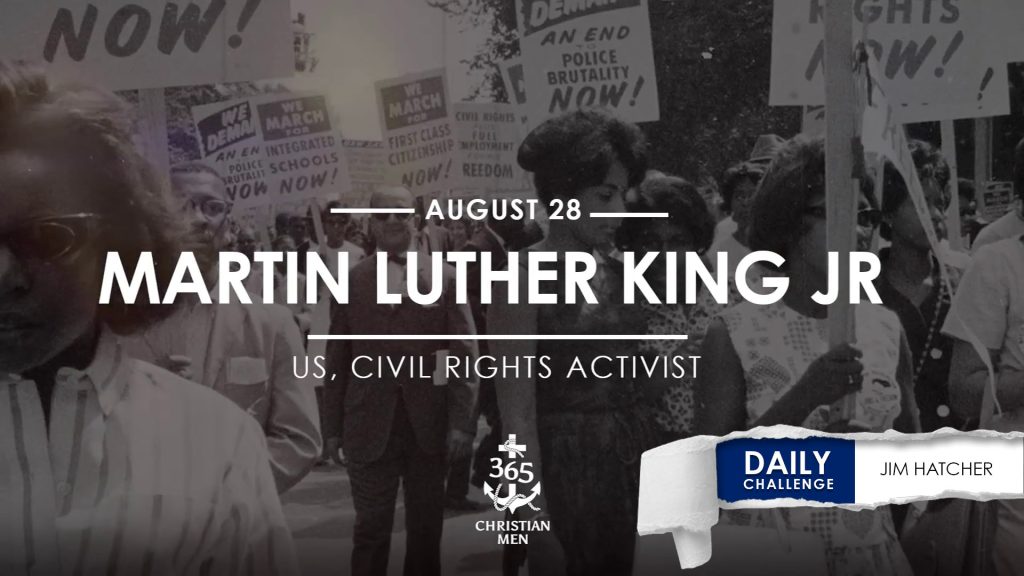August 28. Martin Luther King Jr. King started college when he was 15, and he questioned religion in general. But by the time he became a senior, he had met the Lord Jesus and knew His love and goodness.
King went on to seminary, where the president was outspoken about civil rights in America.
King became a Baptist minister and activist and the most visible leader in the Civil Rights Movement starting in 1955.
On this day in 1963, King delivered a speech in which he said, “I have a dream that my four children will one day live in a nation where they will not be judged by the color of their skin but the content of their character.”
In 1968, King was brutally assassinated—for telling the truth. Today’s story is about King’s doggedness.
Darkness can cripple a people until one man has the courage to strike a match.
Racism, hatred, and cruelty had grown to a pervasive darkness. It seeped across the United States and poisoned the minds of men and women. In 1963—100 years after the Emancipation Proclamation—political leaders, business people, some clergy, the man on the street, and kids in the schoolyard heaped emotional and physical abuse on American citizens who happened to be African American. King dreamed of an integrated and unified America—where all men are created equal, and they can all use the same public restrooms.
He wrote about how the dark practice of segregation hurt his little daughter. “You suddenly find your tongue twisted and your speech stammering as you seek to explain to your six-year-old daughter why she can’t go to the public amusement park that has just been advertised on television and see tears welling up in her eyes when she is told that Funtown is closed to colored children and see ominous clouds of inferiority beginning to form in her little mental sky.”
In April 1963, King was determined to bring the light to Birmingham, Alabama. He met with three ministers to plan a city-wide protest against segregation laws.The city leaders would fight back. The group of pastors designed a legal protest, and King met with the City Commissioner to request a permit for the march.
But the Commissioner said, “No, you will not get a permit in Birmingham, Alabama to picket. I will picket you over to the county jail.”
Undeterred by the threat, the campaign launched, and throngs of American citizens demonstrated their opposition to segregation. After a week of protests, Judge William Jenkins Jr. issued a court injunction prohibiting any more public protestsalthough the protestors weren’t doing anything illegal.
The injunction came two days before the final march was scheduled to begin. King decided that he was willing to risk being arrested to demonstrate how serious and wrong segregation was. He knew freedom came at a price. The others on the campaign stood firm on King’s decision. The day for the march arrived with a crowd that had gathered at Sixteenth Street Baptist Church ready to go.
As they marched through the city streets, police arrested the campaign leaders near St. Paul Methodist Church.The chief of police arrested King and took him to jail.
They put King in solitary confinement. He was forbidden any communication for the first twenty-four-hours, not even a phone call to his wife, who was recovering from the birth of their fourth child.
Despite the harsh treatment, the fire inside King still burned. So he sat in his cold cell and wrote out the reasons he had risked his life for the people’s freedom. “Just as the prophets of the eighth century B.C. left their villages and carried their “thus saith the Lord” far beyond the boundaries of their home towns, and just as the Apostle Paul left his village of Tarsus and carried the gospel of Jesus Christ to the far corners of the Greco-Roman world, so am I compelled to carry the gospel of freedom beyond my own home town. Like Paul, I must constantly respond to the Macedonian call for aid.”
The margins of a newspaper and a roll of toilet paper carried the weight of his words.He wrote to light the fire in more and more Americans. “We know through painful experience that freedom is never voluntarily given by the oppressor; it must be demanded by the oppressed.”
“Learn to do good. Seek justice. Help the oppressed. Defend the cause of orphans. Fight for the rights of widows” (Isaiah 1:17 NLT).
In lots of ways, darkness still spreads. What can you do today to shine a light on it? Darkness can cripple a people until one man has the courage to strike a match.
National Archives. “The Emancipation Proclamation.” Reviewed April 17, 2019. www.archives.gov/exhibits/featured-documents/emancipation-proclamation.
King, Martin Luther Jr. African Studies Center. “Letter from a Birmingham Jail.” Accessed June 24, 2020. www.africa.upenn.edu/Articles_Gen/Letter_Birmingham.html.
Birmingham Times. “The Momentous Events Leading to Martin Luther King Jr.’s ‘Letter from Birmingham Jail.’” Published January 12, 2017. www.birminghamtimes.com/2017/01/the-momentous-events-leading-to-martin-luther-kings-letter-from-birmingham-jail/.
Roy, Deborah A. SCOTUSblog. “The Good Friday parade: Birmingham—April 12, 1963.” Posted August 28, 2013. https://www.scotusblog.com/2013/08/the-good-friday-parade-birmingham-april-12-1963/.
Jeffries, Hasan Kwame. Encyclopedia of Alabama. “Modern Civil Rights Movement in Alabama.” Updated March 31, 2017. www.encyclopediaofalabama.org/article/h-1580.
Wright, Barnett. “1963 In Birmingham, Alabama: A timeline of events.” Posted January 1, 2013. blog.al.com/spotnews/2013/01/1963_in_birmingham_alabama_a_t.html.
Los Angeles Times. “Jack Warren; Policeman Involved in Martin Luther King Jr. Arrest.” Posted March 18, 1991. https://www.latimes.com/archives/la-xpm-1991-03-18-mn-288-story.html.
Fuller, John, and Kathryn Whitbourne. How the Civil Rights Movement Worked. “Jim Crow Laws.” Accessed June 24, 2020. https://history.howstuffworks.com/historical-events/civil-rights-movement1.htm.
Story read by: Chuck Stecker
Introduction read by: Daniel Carpenter
Audio production: Joel Carpenter
Editor: Teresa Crumpton, https://authorspark.org/
Project Manager: Blake Mattocks
Copyright 2020, 365 Christian Men, LLC. All rights reserved.





